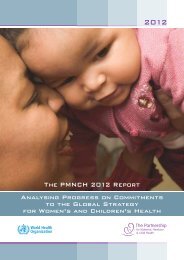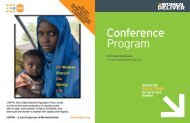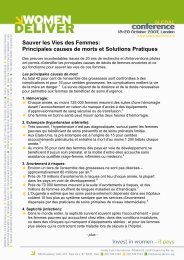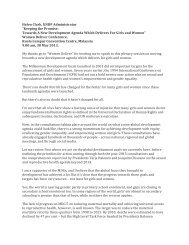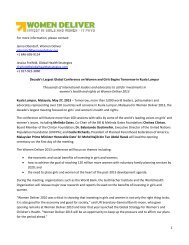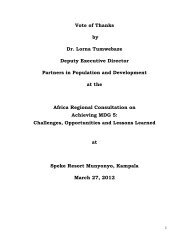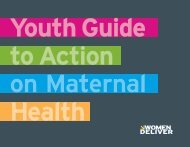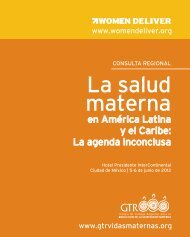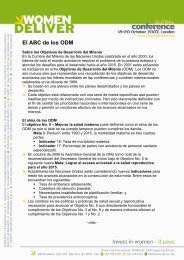State of World Population 2012 - UNFPA Haiti
State of World Population 2012 - UNFPA Haiti
State of World Population 2012 - UNFPA Haiti
You also want an ePaper? Increase the reach of your titles
YUMPU automatically turns print PDFs into web optimized ePapers that Google loves.
CHAPTERFOURThe social and economicimpact <strong>of</strong> family planningBeing able to exercise the right to family planning—and more broadly theright to sexual and reproductive health—is instrumental for the realization <strong>of</strong>other rights and also yields many economic benefits to individuals, households,communities and whole countries. Better reproductive health, including familyplanning, affects the economy—and therefore sustainable development—innumerous ways. Women who have fewer risky births, healthier pregnancies andtEduardo MondlaneUniversity.Geography class.©<strong>UNFPA</strong>/Pedro Sá daBandeirasafer deliveries face lower risks <strong>of</strong> mortalityand improved overall health.Their babies areborn healthier and their children’s health isbetter early in life. These improvements inhealth produce an array <strong>of</strong> economic benefits:greater investments in schooling, greater productivity,greater labour force participationand eventually increased income, savings,investment and asset accumulation. Thereis little evidence, however, about the impacton the lives <strong>of</strong> men.Researchers attempting to document themagnitude <strong>of</strong> these relationships face severalhurdles, partly because the use <strong>of</strong> family planningdepends on a variety <strong>of</strong> other variables,including income, education (particularlyfemale education), opportunities for femaleemployment, the pace <strong>of</strong> industrialization andurbanization, cultural and social norms andthe cost <strong>of</strong> raising children. These variables aredifficult to measure and have strong effects oneach other.Family planning and the well-being<strong>of</strong> womenHealth impactThe economic impact <strong>of</strong> improved reproductivehealth on women’s lives begins with improvementsin their own health, in which accessto family planning plays a key role. Access t<strong>of</strong>amily planning reduces overall fertility, thenumbers <strong>of</strong> unintended pregnancies as well asthe number <strong>of</strong> risky pregnancies, which thenreduces the risks <strong>of</strong> maternal mortality andlong-term morbidity (Maine et al., 1996).Access to family planning can also lead to moreoptimal birth spacing, which in turn improvesoverall maternal health by lowering maternaldepletion syndrome and the risks <strong>of</strong> prematuredelivery and complications (Conde-Agudelo,Rosas-Bermudez and Kafury-Goeta, 2007).In Sri Lanka for example, the sharpestdeclines in maternal mortality occurred duringits period <strong>of</strong> fertility decline. Today, Sri Lankahas one <strong>of</strong> the highest contraceptive prevalenceTHE STATE OF WORLD POPULATION <strong>2012</strong>71




